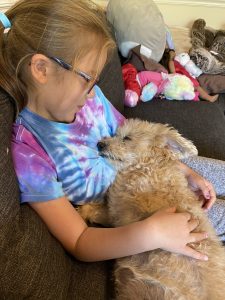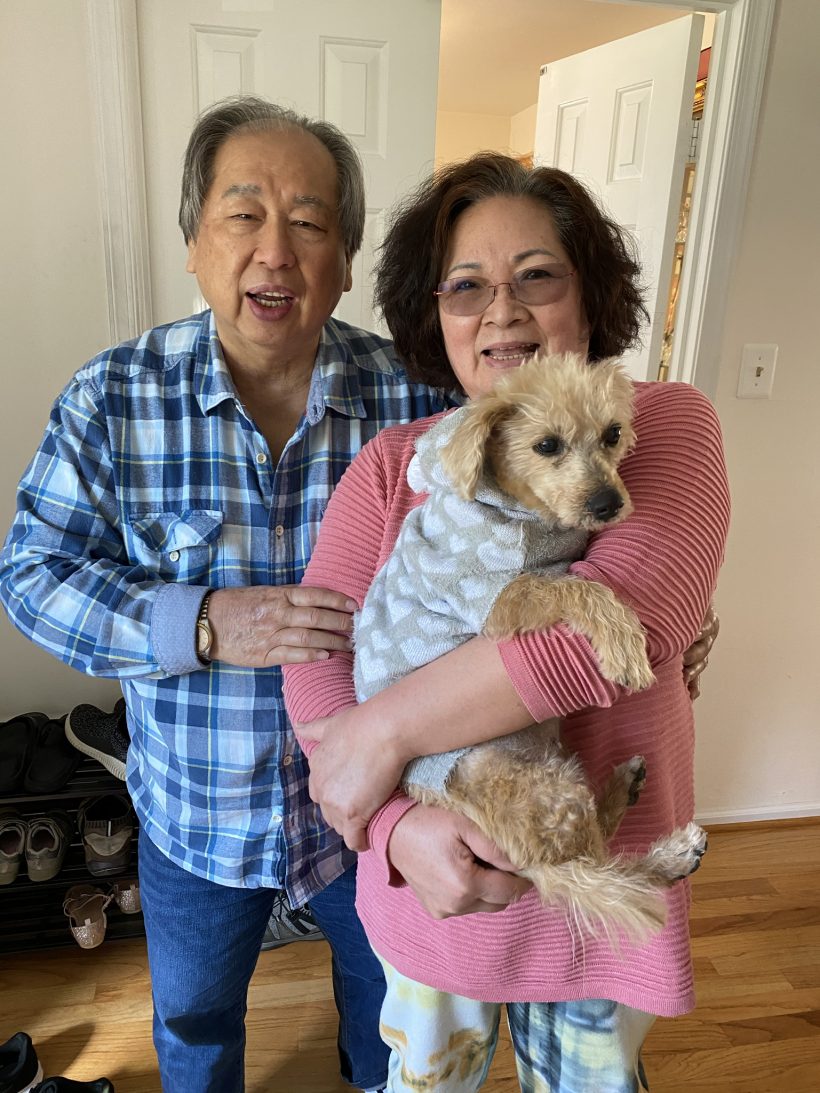 From the looks of her Instagram page, the beige terrier mix dog named Macy is doing all right. Macy frolics in the yard, snoozes on the couch, cuddles with her people, listens to a little girl read her a story. No matter that she has only three legs and is a bit on the “senior” side.
From the looks of her Instagram page, the beige terrier mix dog named Macy is doing all right. Macy frolics in the yard, snoozes on the couch, cuddles with her people, listens to a little girl read her a story. No matter that she has only three legs and is a bit on the “senior” side.
“She’s just a peaceful dog, and she fits right in with our loud, busy family,” reports Julie DeFrain, who adopted Macy in March after meeting her at the Animal Welfare League of Alexandria (AWLA), shortly after the dog was transferred in from a rescue group in Florida. Macy blended quickly with DeFrain’s household, made up of her husband, two children, ages 3 and 6, and DeFrain’s parents, ages 72 and 75. DeFrain says she does most of the walking with Macy, her 6-year-old daughter handles most of the feeding and her parents take care of a lot of the snuggling.
At age 8, Macy is considered a senior dog. “We were just looking for a dog that fit our family and we were excited to love and spoil,” DeFrain said. “It was less about age for us and more about personality. The kids are completely in love with her.”
DeFrain, a government attorney, says Macy has been her office mate while working at home during the pandemic. Macy’s favorite activity, though, is watching TV with the kids or DeFrain’s parents. “We weren’t looking for a dog to go camping and hiking with,” she said. “Macy’s more of a yoga dog than a hiking dog.”
The AWLA considers any animal aged 8 or older to be a senior, and seniors make up about 30 percent of the shelter’s usual population. Seniors aren’t just for seniors — they appeal to all adopter age brackets. “They are so much easier than puppies or younger animals and are generally well house trained,” said AWLA Executive Director Stella Hanly. “Most of them are very grateful that they have a soft, warm place to live — and be loved.”
Hanly has an extensive track record with senior pets — her family dog, Rupert, is going on 16, and she has hosted a series of seniors, including an 18-year-old cat, as office mates on their way to adoption. “They’re so quiet, I absolutely love the company,” she said. “For work mates, seniors are my favorites.”
Some senior animals do experience health challenges, typically dental problems, arthritis and kidney issues. Often these can be well-managed by adopters, Hanly said.
 Annie Sung, a 31-year-old Certified Public Accountant, had no experience with pets when she decided to adopt a senior Chihuahua mix known as Pepe from the AWLA. “Meeting him for the first time, I was thinking that this is a dog version of me,” Sung recalled. Renamed Teddy, the dog was blind in one eye and soon after adoption lost sight in the other eye. Double surgery to remove the eyes put him on the right path, Sung says. “He’s just the sweetest dog,” she said. “He’s completely house-trained, doesn’t bark, and all of my friends and the people he meets on the street like him.”
Annie Sung, a 31-year-old Certified Public Accountant, had no experience with pets when she decided to adopt a senior Chihuahua mix known as Pepe from the AWLA. “Meeting him for the first time, I was thinking that this is a dog version of me,” Sung recalled. Renamed Teddy, the dog was blind in one eye and soon after adoption lost sight in the other eye. Double surgery to remove the eyes put him on the right path, Sung says. “He’s just the sweetest dog,” she said. “He’s completely house-trained, doesn’t bark, and all of my friends and the people he meets on the street like him.”
Sung says Teddy’s trust in her has blossomed as he has adapted to his loss of vision. As they walk together and Teddy approaches an unseen obstacle, Sung says “watch” and the dog stops. Then once the barrier is removed, she says “OK” and he moves forward. He now keeps pace with Sung and even will take off running. “It brings me a lot of joy to see how he’s adapted,” she said.
“I can’t imagine my life without Teddy,” Sung said. “I know it sounds corny, but I never thought I could love so much.”
This story was originally printed in the Alexandria Gazette on August 25.
Get the latest animal news right to your inbox!


